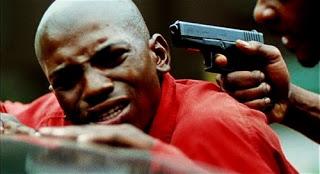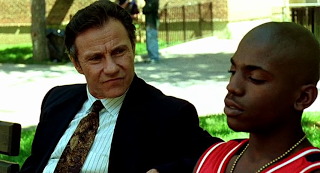 Few of Spike Lee's movies fit easily into genres. Clockers (1995) has elements of a crime thriller, a whodunit and an urban drama, singed with searing topicality. Somehow it's both more restrained and angrier than usual, with Lee tackling direct fashion. Strike (Mekhi Phifer) is a "clocker," a small-time drug dealer working for Brooklyn crime boss Rodney Little (Delroy Lindo). When Darryl Adams (Steve White), a rival dealer, turns up dead, Strike's straight-laced brother Victor (Isaiah Washington) confesses. But Detective Rocco Klein (Harvey Keitel) suspects Strike, hounding the young man for the truth. Strike's trapped in an impossible position: resist and risk arrest, cooperate and face Rodney's wrath. Lee could never be accused of subtlety, but Clockers clobbers the audience with its message. An opening montage of real-life shootings sets the tone: drugs, violence and urban decay rots Brooklyn's black community from the inside out. Lee blames institutional racism, uncaring authorities and exploitative slumlords, but also urban youth for playing into "gangsta" stereotypes. From rap music to video games and graffiti, they thrive on violence and despair. Inevitably, it absorbs kids like Tyrone (Pee Wee Love), who find criminal glamor more appealing than hectoring authority figures. If Clockers seems pedantic, it's still compelling. Lee and novelist Richard Price give the story depth and immediacy transcending its clichés. Strike doesn't enjoy his lifestyle but lacks the wit or will to escape; he nurses a bleeding ulcer and drinks milk, his soul wounded, constantly infantilized. Strike plays with model trains and dreams of escaping, but can't confront Rodney or steer away from crime. Not that the alternative's better: Victor's a self-loathing wreck, belying his beloved status. He can only mature by rejecting his lifestyle.
Few of Spike Lee's movies fit easily into genres. Clockers (1995) has elements of a crime thriller, a whodunit and an urban drama, singed with searing topicality. Somehow it's both more restrained and angrier than usual, with Lee tackling direct fashion. Strike (Mekhi Phifer) is a "clocker," a small-time drug dealer working for Brooklyn crime boss Rodney Little (Delroy Lindo). When Darryl Adams (Steve White), a rival dealer, turns up dead, Strike's straight-laced brother Victor (Isaiah Washington) confesses. But Detective Rocco Klein (Harvey Keitel) suspects Strike, hounding the young man for the truth. Strike's trapped in an impossible position: resist and risk arrest, cooperate and face Rodney's wrath. Lee could never be accused of subtlety, but Clockers clobbers the audience with its message. An opening montage of real-life shootings sets the tone: drugs, violence and urban decay rots Brooklyn's black community from the inside out. Lee blames institutional racism, uncaring authorities and exploitative slumlords, but also urban youth for playing into "gangsta" stereotypes. From rap music to video games and graffiti, they thrive on violence and despair. Inevitably, it absorbs kids like Tyrone (Pee Wee Love), who find criminal glamor more appealing than hectoring authority figures. If Clockers seems pedantic, it's still compelling. Lee and novelist Richard Price give the story depth and immediacy transcending its clichés. Strike doesn't enjoy his lifestyle but lacks the wit or will to escape; he nurses a bleeding ulcer and drinks milk, his soul wounded, constantly infantilized. Strike plays with model trains and dreams of escaping, but can't confront Rodney or steer away from crime. Not that the alternative's better: Victor's a self-loathing wreck, belying his beloved status. He can only mature by rejecting his lifestyle. Where Price makes Rocco a co-protagonist, Lee reduces his role. He mostly badgers Strike for information while spouting off-color jokes. Clockers subverts cop movie clichés: Rocco and his colleagues joke about shooting victims, played for dark humor anywhere else but sick and disrespectful here. Nonetheless, Rocco has a moral core transcending prejudice; when Tyrone lands in trouble, Rocco crafts a cover story to save him. His bluntness even earns Strike's respect; a man so crude can only be honest.
Where Price makes Rocco a co-protagonist, Lee reduces his role. He mostly badgers Strike for information while spouting off-color jokes. Clockers subverts cop movie clichés: Rocco and his colleagues joke about shooting victims, played for dark humor anywhere else but sick and disrespectful here. Nonetheless, Rocco has a moral core transcending prejudice; when Tyrone lands in trouble, Rocco crafts a cover story to save him. His bluntness even earns Strike's respect; a man so crude can only be honest.Lee isn't interested in the whodunit; Darryl's killer gets a bland non-reveal, and Strike's rivalry with Rodney fizzles out. Lee's direction skews docudrama, depicting police raids, street life and arguments with forceful immediacy, propelled by a high-caliber rap and R&B soundtrack. Surprisingly, his flashy moments flop. Rocco coaches Tyrone on his story in a cheesy self-insert fantasy; it recalls The Boston Strangler, with Henry Fonda literally getting into Tony Curtis's head. Similarly, closing images connecting Strike's model trains with his escape seems unnecessarily obvious.
Mekhi Phifer makes Strike a compelling lead, conflicted and headstrong yet likeable. Phifer nabbed a recurring role on TV's E.R. and occasional movie work (8 Mile, Divergent) but hasn't become an A lister. Delroy Lindo's collected menace and Isaiah Washington's uptight neuroses provide nice counterpoints. Harvey Keitel's intensity and off-color humor makes Rocco a compelling character. Tom Byrd's character inconsistently veers between eccentric junkie and psychopath. John Turturro plays Rocco's partner and Lee himself has a walk-on. Clockers isn't great Spike Lee, less flashy, more preachy than usual despite its genre trappings. But its relative restraint makes the anger all the more compelling. Sadly, urban violence remains a perennial violence; Lee doesn't have a solution but demands we pay attention.

